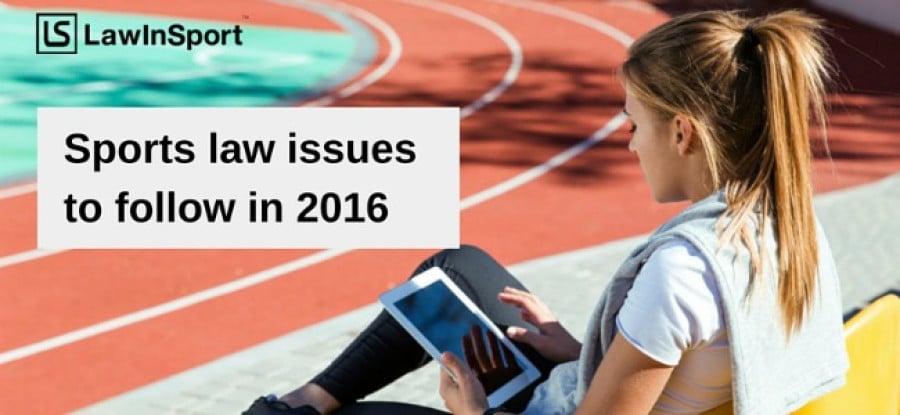What are the top sports law issues to watch in 2016?
Thursday, 14 January 2016Following on from our earlier article ‘Key sports law cases and legal developments of 2015’ one can clearly see the growing importance of sports lawyers in world of sport. This is a typical characteristic of a maturing industry. An industry one that requires more robust checks and balances in place to not only protect the fundamental rights of individuals who participate in sport, but also commercial rights which can, if used responsibly, help grow participation and popularity of sport.
So with 2016 promising to be the year in which a greater role is played by lawyers in sports, what cases and developments do you follow? We have asked our Advisory and Editorial Board members to share what they think will be the trends of 2016.
Mark Hovell, Head of Sport, Mills & Reeve
 Looking forward to 2016, will every athlete look at running a “Livermore” defence? I suspect many will try (in fact the UKAD Appeal Body rejected the defence in a 2015 case involving a darts player), but only a few will succeed. Jake’s case was specific to the tragic circumstances he faced, but perhaps it will start the debate that sport needs to recognise the high level of depression and mental illness that exists and to look at how flexible Rules and Regulations are to deal with athletes suffering this way. Jake did not take a banned substance to enhance his sporting performance in any way. Thankfully the Panel recognised this, as not to have and to have banned him, would have only added to his off field issues.
Looking forward to 2016, will every athlete look at running a “Livermore” defence? I suspect many will try (in fact the UKAD Appeal Body rejected the defence in a 2015 case involving a darts player), but only a few will succeed. Jake’s case was specific to the tragic circumstances he faced, but perhaps it will start the debate that sport needs to recognise the high level of depression and mental illness that exists and to look at how flexible Rules and Regulations are to deal with athletes suffering this way. Jake did not take a banned substance to enhance his sporting performance in any way. Thankfully the Panel recognised this, as not to have and to have banned him, would have only added to his off field issues.
Prof. Jack Anderson, Reader in Law, Queen's University Belfast,
 One of the stories to look out for in 2016 will be the issue of child trafficking in football and the story of so-called “soccer slaves”. Allegations that thousands of young boys are being trafficked from Africa to Europe on the pretence of being given football trials at leading clubs has been the subject of some concern but little research. New research by journalist Ed Hawkins (The Lost Boys: Inside Football’s Slave Trade, Bloomsbury) reveals a rather more complex picture. Hawkins’ excellent investigative journalism lends itself to further academic research and is a story to watch in the wider context of the commissioning by FIFA in late 2015 of Harvard Kennedy School professor and former United Nations official John Ruggie to draft a set of recommendations for applying the UN’s “Guiding Principles on Business and Human Rights“ to FIFA’s policies and practices. Good luck with that Professor Ruggie!
One of the stories to look out for in 2016 will be the issue of child trafficking in football and the story of so-called “soccer slaves”. Allegations that thousands of young boys are being trafficked from Africa to Europe on the pretence of being given football trials at leading clubs has been the subject of some concern but little research. New research by journalist Ed Hawkins (The Lost Boys: Inside Football’s Slave Trade, Bloomsbury) reveals a rather more complex picture. Hawkins’ excellent investigative journalism lends itself to further academic research and is a story to watch in the wider context of the commissioning by FIFA in late 2015 of Harvard Kennedy School professor and former United Nations official John Ruggie to draft a set of recommendations for applying the UN’s “Guiding Principles on Business and Human Rights“ to FIFA’s policies and practices. Good luck with that Professor Ruggie!
John Mehrzad, Head of Sports Group, Littleton Chambers
 Other than an appeal in the Heinz Muller case (see my case of 2015), the Pechstein appeal is the one which leaps out for me since it has the potential to change the approach to sports arbitration at a global level by determining whether sports arbitration clauses are binding and fair.
Other than an appeal in the Heinz Muller case (see my case of 2015), the Pechstein appeal is the one which leaps out for me since it has the potential to change the approach to sports arbitration at a global level by determining whether sports arbitration clauses are binding and fair.
Daniel Geey, Partner, Sheridans
 The esports market is a fascinating growth area within the wider sports industry. The online streaming figures are astronomical, arenas are packed out and esports teams and individual superstars are moving into the mainstream. As greater exposure leads to more commercial opportunities, a whole host of legal and regulatory issues will come to the fore.
The esports market is a fascinating growth area within the wider sports industry. The online streaming figures are astronomical, arenas are packed out and esports teams and individual superstars are moving into the mainstream. As greater exposure leads to more commercial opportunities, a whole host of legal and regulatory issues will come to the fore.
Kevin Carpenter, Principal, Captivate Legal and Sport Solutions
 Being a person who specialises in integrity and governance matters, I am undoubtedly looking forward to the inevitable CAS hearings regarding FIFA's decisions to ban their previous supreme leader Mr Blatter and their prodigal son Mr Platini for 8 years each from all football-related activity. Given the surprising (to say the least) CAS award in overturning Mohammed Bin Hammam's sanction in 2012 (CAS 2011/A/2625), in a similar case on alleged governance corruption, the CAS Panel selected to hear the Blatter and Platini cases will be extra mindful I suspect in the hearings and their deliberations.
Being a person who specialises in integrity and governance matters, I am undoubtedly looking forward to the inevitable CAS hearings regarding FIFA's decisions to ban their previous supreme leader Mr Blatter and their prodigal son Mr Platini for 8 years each from all football-related activity. Given the surprising (to say the least) CAS award in overturning Mohammed Bin Hammam's sanction in 2012 (CAS 2011/A/2625), in a similar case on alleged governance corruption, the CAS Panel selected to hear the Blatter and Platini cases will be extra mindful I suspect in the hearings and their deliberations.
Talking of the CAS, I wait with interest to see how the Pechstein challenge to the fundamental operation of the CAS. The CAS has faced criticism from a number of quarters in the past 12 months or so, indeed I myself questioned the CAS' role as the bastion of lex sportiva in a blog I wrote on LawInSport back in October 2013, and I believe there will have to be some changes to the 'court' going forward for it to maintain its credibility and legitimacy.
Genevieve Gordon, Principal, Tactic Counsel
 One to watch for 2016 is the legal responsibility of sports organisations, clubs and governing bodies to recognise and actively assist athletes that are potential candidates for mental health problems. It will be interesting to see how we move from a moral to a legal stance in a scenario that will, in my opinion, play out one way. An athlete will be successful in making a civil claim against their club or governing body using the simple legal principle of contributory negligence. That is to say that governing bodies and clubs will become legally responsible for the pressure they place on their athletes whilst in periods of competition at least. There have been numerous murmurs relating to the pressure of tours by well known cricketers and how this has affected the players ability to perform but at the same time has left them in a very complex conundrum of play or lose the place they have worked so hard to gain. Does sport need to be forgiving on the those it looks to offer success to? That is my question for 2016.
One to watch for 2016 is the legal responsibility of sports organisations, clubs and governing bodies to recognise and actively assist athletes that are potential candidates for mental health problems. It will be interesting to see how we move from a moral to a legal stance in a scenario that will, in my opinion, play out one way. An athlete will be successful in making a civil claim against their club or governing body using the simple legal principle of contributory negligence. That is to say that governing bodies and clubs will become legally responsible for the pressure they place on their athletes whilst in periods of competition at least. There have been numerous murmurs relating to the pressure of tours by well known cricketers and how this has affected the players ability to perform but at the same time has left them in a very complex conundrum of play or lose the place they have worked so hard to gain. Does sport need to be forgiving on the those it looks to offer success to? That is my question for 2016.
Andrew Nixon, Head of Sports Group, Sheridans
 Agree with Dan Geey – 2016 is the year of Esports. The commercial developments will happen and happen fast, because there is huge investment coming into leagues by publishers and other investors: all of this is very exciting. However, Dan touches upon a key point when he mentions regulatory issues. Esports, as an industry, remains broadly speaking unregulated (or rather inconsistently regulated) (from an integrity perspective, in particular) and as betting on Esports becomes more popular, there will be a greater risk of match and micro fixing. It is key that leagues do not just focus on commercial success and invest in tackling this issue from the outset and, in any event integrity and commercial success go hand in hand as partners, stakeholders and sponsors need to be able to trust the competitions.
Agree with Dan Geey – 2016 is the year of Esports. The commercial developments will happen and happen fast, because there is huge investment coming into leagues by publishers and other investors: all of this is very exciting. However, Dan touches upon a key point when he mentions regulatory issues. Esports, as an industry, remains broadly speaking unregulated (or rather inconsistently regulated) (from an integrity perspective, in particular) and as betting on Esports becomes more popular, there will be a greater risk of match and micro fixing. It is key that leagues do not just focus on commercial success and invest in tackling this issue from the outset and, in any event integrity and commercial success go hand in hand as partners, stakeholders and sponsors need to be able to trust the competitions.
Nina Goolamali, Head of Sports Group, 2 Temple Gardens
 Given the serious impact which injuries have not only on players but on club performance and reputation, 2016 is likely to see heightened scrutiny and litigation arising out of medical assessments conducted both on field (eg compliance with Concussion Protocols) and off field to ensure that risk to players is minimised.
Given the serious impact which injuries have not only on players but on club performance and reputation, 2016 is likely to see heightened scrutiny and litigation arising out of medical assessments conducted both on field (eg compliance with Concussion Protocols) and off field to ensure that risk to players is minimised.
Professor Mark James, Professor of Sports Law, Manchester Law School.
 This could also come from skating. In October 2015, the European Commission opened a formal antitrust investigation into the International Skating Union (ISU) rules that ban skaters for life if they take part in unofficial events.
This could also come from skating. In October 2015, the European Commission opened a formal antitrust investigation into the International Skating Union (ISU) rules that ban skaters for life if they take part in unofficial events.
The skaters involved, Mark Tuitert and Niels Kerstholt, are seeking to compete in lucrative out of season, but unsanctioned, competitions and have asked the Commission to investigate whether the prospective punishment constitutes an anti-competitive agreement and/or is an abuse of a dominant market position. A finding against the ISU could make it easier for new organisations to set up rival competitions as the current official governing bodies would no longer be able to enforce exclusivity arrangements on competitors as a matter of course.
Alex Kelham, Managing Associate & Head of Sports Group, Lewis Silkin
 We will be watching athletes responses to my case of 2015, the IOC relaxing Rule 40 of the Olympic Charter (which prevents athletes from allowing their name, image or sporting performance to be used in advertising during the ‘blackout period’ without permission of the IOC). It will be interesting to see if athletes will accept this compromise, or whether they’ll still feel they should be able to better exploit their once-in-every-four-years moment in the spotlight. Will we see ‘#wedemandmorechange’ in 2016?
We will be watching athletes responses to my case of 2015, the IOC relaxing Rule 40 of the Olympic Charter (which prevents athletes from allowing their name, image or sporting performance to be used in advertising during the ‘blackout period’ without permission of the IOC). It will be interesting to see if athletes will accept this compromise, or whether they’ll still feel they should be able to better exploit their once-in-every-four-years moment in the spotlight. Will we see ‘#wedemandmorechange’ in 2016?
We’ll be watching in 2016 is what happens to the fantasy sports accused of running illegal betting operations in some US states. Despite millions of people signing up to play with brands like Fan Duel and Draft Kings in the last few years, their legality is now under attack. According to my colleague, Iain McDonald, who’s been following this closely, this is interesting from a UK perspective as these companies were heavily tipped to enter the UK market in 2016. Will the uncertainty in the US impact the scale of the UK market entry? If fantasy sports are banned in some States will they still proceed to launch in the UK? If not this could have serious implications for some partnership deals that Draft Kings in particular are rumoured to have put in place with UK clubs.
Vijay Parbat, Head of Legal, UK Sport
 I think that athlete consent as general concept (see comments in article on cases of 2015) is going to be one of the biggest issues in 2016 and beyond making it important for sports organisations to obtain consent in clear and unambiguous terms and ensure it is regularly reviewed and updated.
I think that athlete consent as general concept (see comments in article on cases of 2015) is going to be one of the biggest issues in 2016 and beyond making it important for sports organisations to obtain consent in clear and unambiguous terms and ensure it is regularly reviewed and updated.
Benoit Keane, Principal, Keane Legal
 I am going to suggest a non-sports case. The current competition investigation by the European Commission into the major film studios could have a major impact for the way rights are sold for sports content. The case arose in the first instance because the European Commission was unhappy with the way the major film studios had implemented the 2011 ruling of the European Court of Justice in the Karen Murphy / FA Premier League case. Given this background, it is perhaps no surprise that the FA Premier League is now intervening as an “interested party” in the major film studios case. However, the implications for other sports rights owners generally could be profound (as Manchester United recently recognised in a recent financial report). In July 2015, the Commission issued its Statement of Objections where it claimed that each of the six studios and Sky UK have bilaterally agreed to put in place contractual restrictions that prevent Sky UK from allowing EU consumers located elsewhere to access, via satellite or online, pay-TV services available in the UK and Ireland. The oral hearing is scheduled to take place in January 2016 and a decision by the Commission to issue an infringement decision or to withdraw the allegations could be expected later in the year.
I am going to suggest a non-sports case. The current competition investigation by the European Commission into the major film studios could have a major impact for the way rights are sold for sports content. The case arose in the first instance because the European Commission was unhappy with the way the major film studios had implemented the 2011 ruling of the European Court of Justice in the Karen Murphy / FA Premier League case. Given this background, it is perhaps no surprise that the FA Premier League is now intervening as an “interested party” in the major film studios case. However, the implications for other sports rights owners generally could be profound (as Manchester United recently recognised in a recent financial report). In July 2015, the Commission issued its Statement of Objections where it claimed that each of the six studios and Sky UK have bilaterally agreed to put in place contractual restrictions that prevent Sky UK from allowing EU consumers located elsewhere to access, via satellite or online, pay-TV services available in the UK and Ireland. The oral hearing is scheduled to take place in January 2016 and a decision by the Commission to issue an infringement decision or to withdraw the allegations could be expected later in the year.
Kendrah Potts, Legal Director, Mishcon de Reya LLP
 Following the investigations and findings of corruption and mismanagement in a number of sports in 2015, integrity and good governance will be key issues in 2016. The second WADA Independent Commission report, which is due to set out the Commission's findings regarding the IAAF's conduct in the context of the doping and corruption in athletics, is due to be published in January. In addition, investigations, which have already led to arrests and bans, continue into the corruption that has taken place within FIFA. The FIFA election will take place in February and the new President will be under intense pressure to reform the institution.
Following the investigations and findings of corruption and mismanagement in a number of sports in 2015, integrity and good governance will be key issues in 2016. The second WADA Independent Commission report, which is due to set out the Commission's findings regarding the IAAF's conduct in the context of the doping and corruption in athletics, is due to be published in January. In addition, investigations, which have already led to arrests and bans, continue into the corruption that has taken place within FIFA. The FIFA election will take place in February and the new President will be under intense pressure to reform the institution.
One of the key challenges for sport over the next twelve months will be to address the problems of corruption and mismanagement at the highest levels. All sports governing bodies need appropriate regulations and procedures to ensure good governance. The UCI Independent Commission and WADA Independent Commission reports both highlight the damaging effect that poor management can have on the integrity of sport and the knock-on effect on public interest and a sport's commercial power. The IAAF has already stated its intention to create an independent integrity unit, as part of its efforts to rebuild public confidence in the sport. Whilst it seems unlikely (at least in the short term) that sports will agree to the creation of a worldwide regulator for issues such as match-fixing, it will be interesting to see whether other sports, learning the lessons from cycling, athletics and football, consider establishing more independent processes for integrity matters and institutional reviews to improve governance.
Jon Walters, Partner, Charles Russell Speechlys
 It’s Olympic year, which means all eye will be on Rio this summer. Of course, the fight to rescue athletics from recent doping and corruption scandal will be front page news, but as a commercial rights lawyer I will be paying close attention to the debate over Rule 40 and national team sponsorship deals. Rule 40 is the restriction on participating athletes appearing in advertising during the Olympic Games. It always elicits passionate views and this year is set to be the most passionate yet against the backdrop of new guidelines issued by the IOC arguably only increasing the ambiguity, athlete (and non-sponsor) mobilisation under #wedemandchange, and the threat of athlete withdrawal on commercial grounds having become a reality at last year’s athletics World Championships (in the form of US 800m runner, Nick Symmonds). It will be a difficult debate for the IOC to win – the message of protecting the Games from promotional activity seems somewhat archaic given the comprehensive sponsor programme run by the IOC and, if the rule exists to protect official partners rather than prevent advertising per se (as the new guidance would suggest), is this not a matter to be addressed by event specific anti-ambush legislation implemented for each Olympiad, not the Olympic Charter?
It’s Olympic year, which means all eye will be on Rio this summer. Of course, the fight to rescue athletics from recent doping and corruption scandal will be front page news, but as a commercial rights lawyer I will be paying close attention to the debate over Rule 40 and national team sponsorship deals. Rule 40 is the restriction on participating athletes appearing in advertising during the Olympic Games. It always elicits passionate views and this year is set to be the most passionate yet against the backdrop of new guidelines issued by the IOC arguably only increasing the ambiguity, athlete (and non-sponsor) mobilisation under #wedemandchange, and the threat of athlete withdrawal on commercial grounds having become a reality at last year’s athletics World Championships (in the form of US 800m runner, Nick Symmonds). It will be a difficult debate for the IOC to win – the message of protecting the Games from promotional activity seems somewhat archaic given the comprehensive sponsor programme run by the IOC and, if the rule exists to protect official partners rather than prevent advertising per se (as the new guidance would suggest), is this not a matter to be addressed by event specific anti-ambush legislation implemented for each Olympiad, not the Olympic Charter?
Nick De Marco, Barrister, Blackstone Chambers
 The three cases to look out for in 2016 all involve challenges to sports governing body’s rules, often on competition law principles. First, the Pechstein case shall go to the highest court in Germany, and the future of sports arbitration, or CAS as currently constituted, may be tested. Second, the continuing saga between QPR and the Football League over the lawfulness of the financial fair play rules has yet to be resolved, and given the FL’s recent announcement to charge other clubs there may be more challenges to those rules. Finally, FIFPro, the world football players union, have brought a competition law challenge to the entire football transfer system as governed by the FIFA regulations.
The three cases to look out for in 2016 all involve challenges to sports governing body’s rules, often on competition law principles. First, the Pechstein case shall go to the highest court in Germany, and the future of sports arbitration, or CAS as currently constituted, may be tested. Second, the continuing saga between QPR and the Football League over the lawfulness of the financial fair play rules has yet to be resolved, and given the FL’s recent announcement to charge other clubs there may be more challenges to those rules. Finally, FIFPro, the world football players union, have brought a competition law challenge to the entire football transfer system as governed by the FIFA regulations.
Ariel Reck, Sports Lawyer (Argentina)
 As to the issue to watch in 2016 (apart from the sagas that the FIFA-Gate still has to offer), it is definitely the action brought by FIFPro -in the form of a competition law complaint- with the European Commission. The action challenges the transfer system, targeting the FIFA regulations for the status and transfer of players, arguing that such rules prevent clubs from fairly competing on the market to acquire sporting talent damaging the rights of small-size clubs, football players and supporters.
As to the issue to watch in 2016 (apart from the sagas that the FIFA-Gate still has to offer), it is definitely the action brought by FIFPro -in the form of a competition law complaint- with the European Commission. The action challenges the transfer system, targeting the FIFA regulations for the status and transfer of players, arguing that such rules prevent clubs from fairly competing on the market to acquire sporting talent damaging the rights of small-size clubs, football players and supporters.
Andrew Smith, Barrister, Matrix Chambers
 It will be interesting to see how the new ‘fast track’ regime for “overdue payables”, as set out in Article 12bis of the FIFA Regulations on the Status and Transfer of Players, operates in practice (including what is regarded as a “prima facie contractual basis” for delaying payment); and whether it changes the attitude of defaulting clubs towards their contractual responsibilities. The effective enforcement of the FIFA ban on Third Party Ownership, as set out in Article 18ter of the RSTP, will also be a matter that is subjected to considerable scrutiny.
It will be interesting to see how the new ‘fast track’ regime for “overdue payables”, as set out in Article 12bis of the FIFA Regulations on the Status and Transfer of Players, operates in practice (including what is regarded as a “prima facie contractual basis” for delaying payment); and whether it changes the attitude of defaulting clubs towards their contractual responsibilities. The effective enforcement of the FIFA ban on Third Party Ownership, as set out in Article 18ter of the RSTP, will also be a matter that is subjected to considerable scrutiny.
John Wolohan, Professor, David B. Falk College of Sport and Human Dynamics at Syracuse University
 Just like 2015, what I am going to be watching for in 2016 is not just a single case but how the courts and the states address the issue of sports gambling. In particular there are two areas that should receive some clarity in 2016. The first is New Jersey’s attempt to introduce sports gambling in the state. Right now, only Nevada, Delaware, Oregon and Montana are legally allowed to offer any form of sports gambling and Nevada is the only state that allows you to bet on individual games. New Jersey has attempted to introduce single game sports gambling in the state and has been stopped twice in Federal Court by the NCAA, and major professional leagues. The Federal Third Circuit Court of Appeals however agreed to hear the case one more time. It should be noted that this case is important not just in New Jersey. As many as ten states from around the country are watching how the courts decide this case before introducing their own sport gambling legislation.
Just like 2015, what I am going to be watching for in 2016 is not just a single case but how the courts and the states address the issue of sports gambling. In particular there are two areas that should receive some clarity in 2016. The first is New Jersey’s attempt to introduce sports gambling in the state. Right now, only Nevada, Delaware, Oregon and Montana are legally allowed to offer any form of sports gambling and Nevada is the only state that allows you to bet on individual games. New Jersey has attempted to introduce single game sports gambling in the state and has been stopped twice in Federal Court by the NCAA, and major professional leagues. The Federal Third Circuit Court of Appeals however agreed to hear the case one more time. It should be noted that this case is important not just in New Jersey. As many as ten states from around the country are watching how the courts decide this case before introducing their own sport gambling legislation.
I believe that the court agreed to hear the case a third time because of the professional sports leagues growing involvement in daily fantasy sports. A number of the leagues and teams are involved as minority owners of the two biggest proprietors of daily fantasy sports: DraftKings and FanDuel. In the past, however, the leagues have always argued that any additional sports gambling would hurt the integrity of the game.
This leads to the second thing I will be watching in 2016 the attempt by some states to classify daily fantasy sports as gambling. Right now, it is not considered gambling under federal law. However, with the growing number of stories involving game manipulation and no regulation of games, a number of states (New York and Illinois the two biggest) have begun to pas law prohibiting daily fantasy sports and classifying it as gambling. Other states, such as California and Massachusetts, are looking at legislation that would either tax or regulate daily fantasy sports industry.
Sean Corbett, Brand Protection Manager, Formula One Management Ltd
 Away from the Courts the Unitary Community Trademark (CTM) which has remained largely unchanged since 1996 sees somewhat of an overhaul for 2016 with the Community Trade Mark being replaced by the European Union Trade Mark and the OHIM being replaced with the European Union Intellectual Property Office. In particular brand owners should watch out for new provisions allowing them to tackle counterfeit “goods in transit” regardless of whether goods are released for free circulation within the EU but perhaps the biggest change effects brand owners seeking to register non-traditional or non-conventional marks such as sounds, smells, colours and tastes which cannot be represented easily according to the Sieckmann criteria (graphical representation must be clear, precise, self-contained easily accessible, intelligible, durable and objective). The new reforms will abolish the requirement for “graphical representation” providing a mark can be represented in a manner which enables the authorities to determine the clear and precise subject matter thus paving the way for motion marks, holograms, sounds and smells. In the world of sport with brands embracing all the digital technologies on offer the possibilities in securing new unconventional trade mark rights could be an eye-opener.
Away from the Courts the Unitary Community Trademark (CTM) which has remained largely unchanged since 1996 sees somewhat of an overhaul for 2016 with the Community Trade Mark being replaced by the European Union Trade Mark and the OHIM being replaced with the European Union Intellectual Property Office. In particular brand owners should watch out for new provisions allowing them to tackle counterfeit “goods in transit” regardless of whether goods are released for free circulation within the EU but perhaps the biggest change effects brand owners seeking to register non-traditional or non-conventional marks such as sounds, smells, colours and tastes which cannot be represented easily according to the Sieckmann criteria (graphical representation must be clear, precise, self-contained easily accessible, intelligible, durable and objective). The new reforms will abolish the requirement for “graphical representation” providing a mark can be represented in a manner which enables the authorities to determine the clear and precise subject matter thus paving the way for motion marks, holograms, sounds and smells. In the world of sport with brands embracing all the digital technologies on offer the possibilities in securing new unconventional trade mark rights could be an eye-opener.
Alfonso Valero, Principal Lecturer, Nottingham Law School
 I would indicate the need for renovation of the governance of sports (and not just football). A situation such as the one of FIFA and UEFA, in which the replacements for the suspended officials are themselves fined (Villar, replacement for Platini) or don't really represent much of a renewal (Issa Hayatou), is far from ideal. A situation such as that of IAAF, when WADA alleges "systemic corruption" cannot be sustained.
I would indicate the need for renovation of the governance of sports (and not just football). A situation such as the one of FIFA and UEFA, in which the replacements for the suspended officials are themselves fined (Villar, replacement for Platini) or don't really represent much of a renewal (Issa Hayatou), is far from ideal. A situation such as that of IAAF, when WADA alleges "systemic corruption" cannot be sustained.
Will the sports governing bodies be able to undergo through real renovation or will they just do some cosmetic change? In all likelihood, this will be still the issue to watch for 2017.
- Ambush Marketing Anti-Corruption Anti-Doping Anti-Trust Athlete Welfare Broadcasting Competition Law Concussion Court of Arbitration for Sport (CAS) Esports European Commission European Court of Justice Fantasy Sport Football Governance Ice-Skating Intellectual Property International Association of Athletics Federations (IAAF) IOC Litigation Olympic Olympic Charter Protection of Minors Regulation Third Party Ownership Trade Mark United Kingdom (UK) United States of America (USA) World Anti-Doping Agency (WADA)

 Global Summit 2024
Global Summit 2024